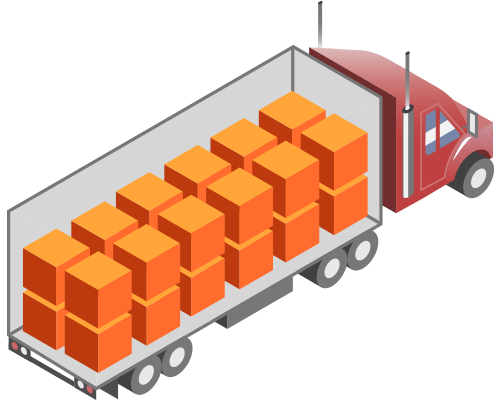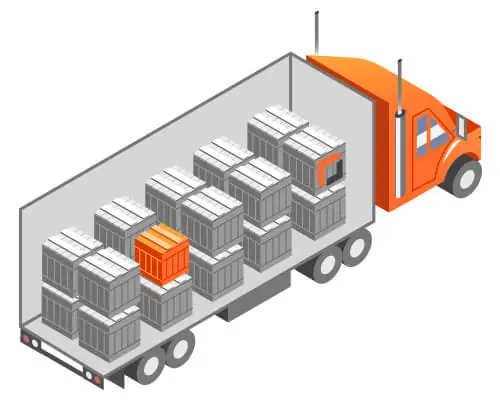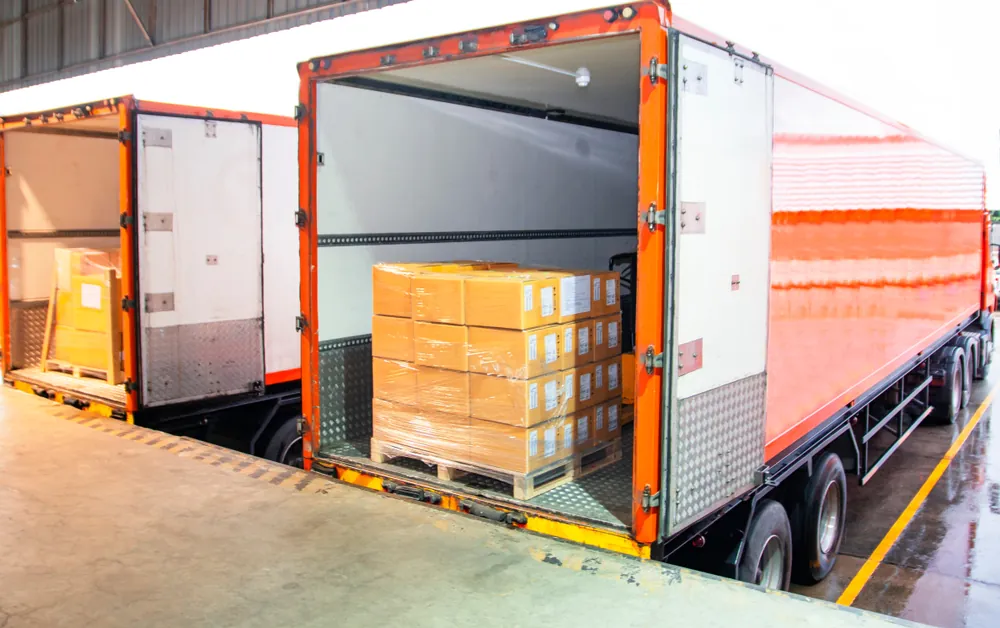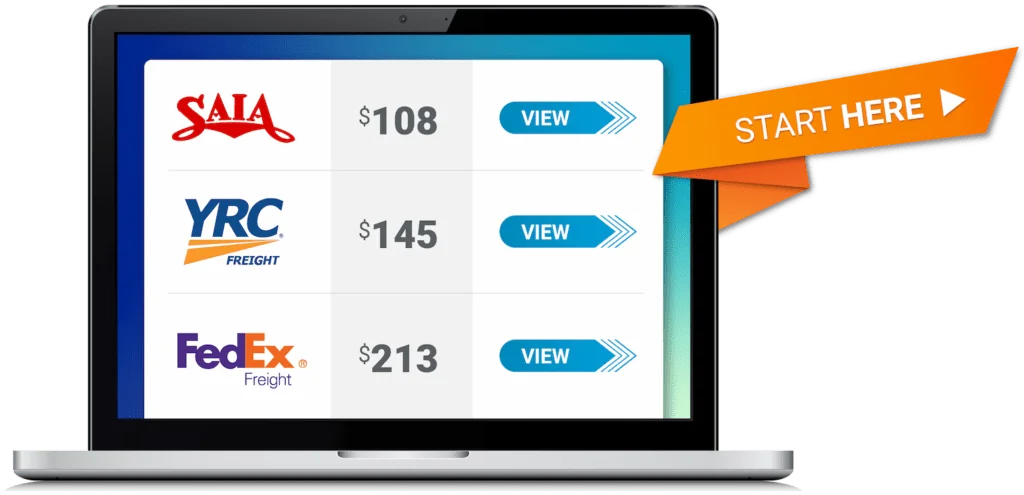Fighting Today: Full Truckload vs Less Than Truckload
Full Truckload vs Less Than Truckload: Which Should You Choose?

Welcome to the arena! If you’re unfamiliar with the ins and outs of freight shipping, then you’re in the right place! Today, we’ll compare two popular freight shipping methods to see which best suits what kinds of shipments and how to choose between them.
First, let’s meet our two shipping combatants: full truckload and less-than-truckload!
First Combatant: Full Truckload!

Full truckload (FTL or TL) shipping is when your shipments take up the entire capacity of a trailer. In other words, your shipment has an entire truck dedicated to getting it from pickup to the delivery location. FTL is like hailing a taxi; the vehicle is owned and driven by someone else, but you are the only one being driven, and the vehicle is heading straight to your destination. Shipments weighing over 15,000 pounds qualify for FTL, though you can order a whole trailer for your shipment even if it weighs less than that.
Second Combatant: Less-Than-Truckload!

Now that we have introductions out of the way, let’s get into the ring, shall we? Entering the arena: Full Truckload vs Less Than Truckload!
TIME TO BATTLE!
We’ll judge each type of shipping based on four categories: the amount of space used during shipping, how well your items are protected during shipping, how fast your items are delivered, and how expensive each shipping type is.
Amount of Space

An FTL truck utilizes the entire trailer for your shipment. No one else is putting their shipment onto yours since it is so big/heavy/valuable enough to warrant it. The type of trailer can also change depending on what type of shipment you’re making. Specialty trailers like temperature-controlled and flatbed trailers can be used with FTL shipping.
Meanwhile, an LTL shipment shares trailer space with other shipments. There isn’t much room for your package to have its own dedicated section.
FTL: An entire trailer to yourself!
LTL: You’re sharing space with other shipments!
Protection From Damage

While it’s true you need to package your items to be as well-protected as possible before pickup, sometimes accidents or poor loading/unloading can occur while your items are in transit. If you are shipping FTL, you don’t have to worry that much; the only items in the trailer are all yours. If you package your items correctly, they are less likely to be damaged en route.
However, the same can’t be said for LTL. Your item is sandwiched between shipments of various sizes and weights, which means sudden braking and road vibrations can shift items in the trailer. Also, multiple transfers between terminals can mean items getting tossed around. It’s fine if your item is sturdy against most things, but delicate items may be at risk of being damaged.
FTL: Less risk of damage during transit
LTL: Increased chance of damage during transit
Transit Speed

FTL is fairly straightforward: a carrier picks up an item, drives it to the delivery site, and drops it off. Depending on the route’s distance, the driver doesn’t stop except for food, sleep, and fuel, meaning a shipment doesn’t have to move from the trailer the entire time. But delivery times are strict; the time you say the carrier should pick up the item is when they’ll come, and the item, barring traffic, weather, and equipment malfunctions, will arrive at the time you estimated during booking.
LTL, meanwhile, has a little more wiggle room. Since many shipments go to different places, a carrier will make several stops to pick up and deliver the other items. They will also make stops at several terminals, where shipments are removed, resorted, and loaded into different trailers going to similar destinations. Therefore, flexibility is expected for LTL shipping. The standard for LTL deliveries is first-come-first-served, 2-hour windows, and the carrier may not even pick up the shipment immediately. You can order an expedited LTL delivery, but those aren’t always available and can be more expensive.
FTL: Faster transit times since items are loaded from one source and go to one destination.
LTL: Transit times are slower because carriers make multiple stops beforehand.
Price

FTL can get costly. You’re buying the use of an entire trailer for a shipment of over 15,000 lbs, which is already a lot to ship. Drivers may also stop at a weigh station to verify whether the truck is under 80,000 lbs, the maximum weight a truck can carry by law. This can add more to your Bill of Lading (BOL) later post-shipment. Otherwise, the driver won’t be doing a full inspection of your shipment until it arrives for delivery, and usually, they won’t add anything extra to the BOL, with few exceptions.
LTL is less expensive since you’re renting out space in a trailer full of other shipments. However, your item will be reweighed once it arrives at the first terminal, known as the origin terminal. The item will enter the dimensioner, a machine that automatically detects an object’s weight and dimensions. If the dimensioner’s readings differ from the original BOL’s specifications, the carrier will update the shipping rate later. Also, any accessorials, like a liftgate or white glove services, are extra expenses.
FTL: Having to buy an entire trailer can get quite expensive.
LTL: Less expensive as you share space with other terminals, but additional charges may apply.
The Results Are In...
The winner is YOU!!
No, but seriously, the type of shipping you should use will depend on your shipment and how much you’re willing to spend on it. Sometimes, it won’t matter; you’ll go with FTL if your shipment is over 15,000 lbs. You can choose between LTL and FTL if your shipment is lighter, though most people usually go with the affordable LTL shipping. However, every shipment is different. Some may have special circumstances to consider, such as fragility, heaviness, and temperature.
Ultimately, it’s best to speak to a carrier or a third-party logistics provider to decide what’s best for you and your shipment. And hey, FreightCenter is one of those providers! Our team of experts can help you decide between FTL and LTL shipping while also handling the rest of the process. Tracking, filling out paperwork, and contacting the carriers—we can handle all that for you. We guarantee competitive rates coupled with tailored solutions for every shipping situation.
Try out our free quote tool, or call us at (800) 716-7608 to get started today!
Oh, and here’s a handy table for you to use to compare FTL and LTL shipping!

